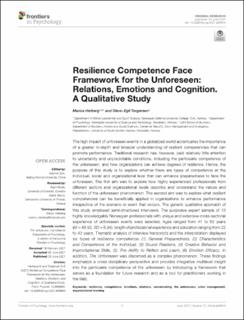| dc.contributor.author | Herberg, Marius | |
| dc.contributor.author | Torgersen, Glenn-Egil | |
| dc.date.accessioned | 2021-07-05T08:12:50Z | |
| dc.date.available | 2021-07-05T08:12:50Z | |
| dc.date.created | 2021-07-02T16:12:04Z | |
| dc.date.issued | 2021 | |
| dc.identifier.citation | Frontiers in Psychology. 2021, 12, 1-24. | en_US |
| dc.identifier.issn | 1664-1078 | |
| dc.identifier.uri | https://hdl.handle.net/11250/2763294 | |
| dc.description.abstract | The high impact of unforeseen events in a globalized world accentuates the importance of a greater in-depth and broader understanding of resilient competencies that can promote performance. Traditional research has, however, paid relatively little attention to uncertainty and unpredictable conditions, including the particulate competence of the unforeseen, and how organizations can achieve degrees of resilience. Hence, the purpose of this study is to explore whether there are types of competence at the individual, social and organizational level that can enhance preparedness to face the unforeseen. The first aim was to explore how highly experienced professionals from different sectors and organizational levels describe and understand the nature and function of the unforeseen phenomenon. The second aim was to explore what resilient competencies can be beneficially applied in organizations to enhance performance irrespective of the scenario or event that occurs. The generic qualitative approach of this study employed semi-structured interviews. The purposive expert sample of 13 highly knowledgably Norwegian professionals with unique and extensive cross-sectorial experience of unforeseen events were selected. Ages ranged from 41 to 62 years (M = 48.92, SD = 6.94), length of professional experience and education ranging from 22 to 43 years. Thematic analysis of interview transcripts and the interpretation displayed six types of resilience competence: (1) General Preparedness, (2) Characteristics and Competence of the Individual, (3) Sound Relations, (4) Creative Behavior and Improvisational Skills, (5) The Ability to Reflect and Learn, (6) Emotion Efficacy. In addition, The Unforeseen was discerned as a complex phenomenon. These findings emphasize a cross-disciplinary perspective and provides integrative multilevel insight into the particulate competence of the unforeseen by introducing a framework that serves as a foundation for future research and as a tool for practitioners working in the field. | en_US |
| dc.language.iso | eng | en_US |
| dc.publisher | Frontiers Media | en_US |
| dc.rights | Navngivelse 4.0 Internasjonal | * |
| dc.rights.uri | http://creativecommons.org/licenses/by/4.0/deed.no | * |
| dc.title | Resilience Competence Face Framework for the Unforeseen: Relations, Emotions and Cognition. A Qualitative Study | en_US |
| dc.type | Peer reviewed | en_US |
| dc.type | Journal article | en_US |
| dc.description.version | publishedVersion | en_US |
| dc.source.pagenumber | 1-24 | en_US |
| dc.source.volume | 12 | en_US |
| dc.source.journal | Frontiers in Psychology | en_US |
| dc.identifier.doi | https://doi.org/10.3389/fpsyg.2021.669904 | |
| dc.identifier.cristin | 1920146 | |
| dc.description.localcode | Copyright © 2021 Herberg and Torgersen. This is an open-access article distributed under the terms of the Creative Commons Attribution License (CC BY). The use, distribution or reproduction in other forums is permitted, provided the original author(s) and the copyright owner(s) are credited and that the original publication in this journal is cited, in accordance with accepted academic practice. No use, distribution or reproduction is permitted which does not comply with these terms. | en_US |
| dc.source.articlenumber | 669904 | en_US |
| cristin.ispublished | true | |
| cristin.fulltext | original | |
| cristin.qualitycode | 1 | |

